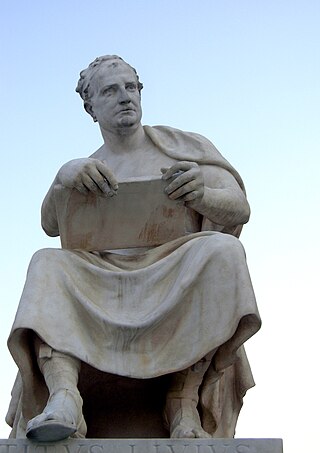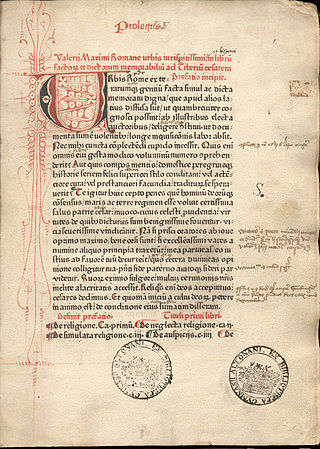Related Research Articles

Titus Livius, known in English as Livy, was a Roman historian. He wrote a monumental history of Rome and the Roman people, titled Ab Urbe Condita, ''From the Founding of the City'', covering the period from the earliest legends of Rome before the traditional founding in 753 BC through the reign of Augustus in Livy's own lifetime. He was on familiar terms with members of the Julio-Claudian dynasty and a friend of Augustus, whose young grandnephew, the future emperor Claudius, he exhorted to take up the writing of history.
Latin literature includes the essays, histories, poems, plays, and other writings written in the Latin language. The beginning of formal Latin literature dates to 240 BC, when the first stage play in Latin was performed in Rome. Latin literature would flourish for the next six centuries. The classical era of Latin literature can be roughly divided into the following periods: Early Latin literature, The Golden Age, The Imperial Period and Late Antiquity.

Nicomedes IV Philopator was the king of Bithynia from c. 94 BC to 74 BC. He was the first son and successor of Nicomedes III of Bithynia.
Gaius Julius Hyginus was a Latin author, a pupil of the scholar Alexander Polyhistor, and a freedman of Caesar Augustus. He was elected superintendent of the Palatine library by Augustus according to Suetonius' De Grammaticis, 20. It is not clear whether Hyginus was a native of the Iberian Peninsula or of Alexandria.
Claudius Claudianus, known in English as Claudian, was a Latin poet associated with the court of the Roman emperor Honorius at Mediolanum (Milan), and particularly with the general Stilicho. His work, written almost entirely in hexameters or elegiac couplets, falls into three main categories: poems for Honorius, poems for Stilicho, and mythological epic.

Gaius Sallustius Crispus, usually anglicised as Sallust, was a Roman historian and politician from an Italian plebeian family. Probably born at Amiternum in the country of the Sabines, Sallust became a partisan of Julius Caesar, circa 50s BC. He is the earliest known Latin-language Roman historian with surviving works to his name, of which Conspiracy of Catiline, The Jugurthine War, and the Histories remain extant. As a writer, Sallust was primarily influenced by the works of the 5th-century BC Greek historian Thucydides. During his political career he amassed great and ill-gotten wealth from his governorship of Africa.

Valerius Maximus was a 1st-century Latin writer and author of a collection of historical anecdotes: Factorum ac dictorum memorabilium libri IX. He worked during the reign of Tiberius.

Lucius Livius Andronicus was a Greco-Roman dramatist and epic poet of the Old Latin period during the Roman Republic. He began as an educator in the service of a noble family by translating Greek works into Latin, including Homer's Odyssey. The works were meant, at first, as educational devices for the school in which he founded. He also wrote works for the stage—both tragedies and comedies—which are regarded as the first dramatic works written in the Latin language. His comedies were based on Greek New Comedy and featured characters in Greek costume. Thus, the Romans referred to this new genre by the term comoedia palliata. The Roman biographer Suetonius later coined the term "half-Greek" of Livius and Ennius. The genre was imitated by the next dramatists to follow in Andronicus' footsteps and on that account he is regarded as the father of Roman drama and of Latin literature in general; that is, he was the first man of letters to write in Latin. Varro, Cicero, and Horace, all men of letters during the subsequent Classical Latin period, considered Livius Andronicus to have been the originator of Latin literature. He is the earliest Roman poet whose name is known.
Quintus Fabius Pictor was the earliest known Roman historian. His history, written in Greek and now mostly lost besides some surviving fragments, was highly influential on ancient writers and certainly participated in introducing Greek historiographical methods to the Roman world. However, the work was highly partisan towards Rome, blaming the Second Punic War on Carthage and idealizing the Roman Republic as a well-ordered state loyal to its allies. Fabius probably served as praetor, was a member of the Senate, and participated in a delegation sent to the oracle at Delphi in 216 BC. Some scholars consider him one of the earliest annalists, although this conclusion has been criticized.

The Second Mithridatic War was one of three wars fought between Pontus and the Roman Republic. This war was fought between King Mithridates VI of Pontus and the Roman general Lucius Licinius Murena.
Quintus Asconius Pedianus was a Roman historian. There is no evidence that Asconius engaged in a public career, but he was familiar both with Roman government of his time and with the geography of the city. He may, therefore, have written much of his works in the city.
Quintus Claudius Quadrigarius was a Roman historian. Little is known of Q. Claudius Quadrigarius's life, but he probably lived in the 1st century BC.
Publius Nigidius Figulus was a scholar of the Late Roman Republic and one of the praetors for 58 BC. He was a friend of Cicero, to whom he gave his support at the time of the Catilinarian conspiracy. Nigidius sided with the Optimates in the civil war between Julius Caesar and Pompeius Magnus.
Roman historiography stretches back to at least the 3rd century BC and was indebted to earlier Greek historiography. The Romans relied on previous models in the Greek tradition such as the works of Herodotus and Thucydides. Roman historiographical forms are usually different from their Greek counterparts, however, and often emphasize Roman concerns. The Roman style of history was based on the way that the Annals of the Pontifex Maximus, or the Annales Maximi, were recorded. The Annales Maximi include a wide array of information, including religious documents, names of consuls, deaths of priests, and various disasters throughout history. Also part of the Annales Maximi are the White Tablets, or the "Tabulae Albatae", which consist of information on the origin of the Roman Republic.

The gens Porcia, rarely written Portia, was a plebeian family at Ancient Rome. Its members first appear in history during the third century BC. The first of the gens to achieve the consulship was Marcus Porcius Cato in 195 BC, and from then until imperial times, the Porcii regularly occupied the highest offices of the Roman state.
Granius Flaccus was an antiquarian and scholar of Roman law and religion, probably in the time of Julius Caesar and Augustus.

Roman mythology is the body of myths of ancient Rome as represented in the literature and visual arts of the Romans. One of a wide variety of genres of Roman folklore, Roman mythology may also refer to the modern study of these representations, and to the subject matter as represented in the literature and art of other cultures in any period. Roman mythology draws from the mythology of the Italic peoples and ultimately from Proto-Indo-European mythology.
Socrates Chrestus was the second son of Nicomedes III of Bithynia. He usurped the Bithynian throne by deposing his elder brother or half brother, Nicomedes IV of Bithynia.
The gens Grania was a plebeian family at ancient Rome. Although none of them ever obtained the consulship, the family was of "senatorial rank", and was well known from the latter half of the second century BC. In Imperial times, a number of them became distinguished in military and provincial service.

Bellum Catilinae, also called De coniuratione Catilinae, is the first history published by the Roman historian Sallust. The second historical monograph in Latin literature, it chronicles the attempted overthrow of the government by the aristocrat Catiline in 63 BC in what has been usually called the Catilinarian conspiracy.
References
- ↑ Gian Biagio Conte, Latin Literature: A History (Johns Hopkins University Press, 1987, 1994), p. 551 online.
- ↑ Michael von Albrecht, A History of Roman Literature (Brill, 1994, 1997), p. 864.
- ↑ Conte, Latin Literature, p. 551; Erich S. Gruen, The Last Generation of the Roman Republic (University of California Press, 1974, 1995), p. 16.
- ↑ Granius, 36; Michael Grant, Ancient Historians (Barnes & Noble, 1970, 1994), p. 211; H.J. Rose, A Handbook of Latin Literature (Routledge, 1936, 1996), p. 219.
- ↑ Rose, Handbook, pp. 29 and 514; Rose rejects the identification, mainly promulgated in the 19th century.
- ↑ Christoph F. Konrad, Plutarch's Sertorius: A Historical Commentary pp. lii and 69.
- ↑ Ralph W. Mathisen, "Paleography and Codicology," in The Oxford Handbook of Early Christian Studies Oxford University Press, 2008, p. 148.
- ↑ Conte, Latin Literature, p. 551.
- ↑ Arnaldo Momigliano, "Jacob Bernays," in A.D. Momigliano: Studies on Modern Scholarship (University of California Press, 1994), p. 130.
- Chisholm, Hugh, ed. (1911). . Encyclopædia Britannica . Vol. 16 (11th ed.). Cambridge University Press. p. 587.